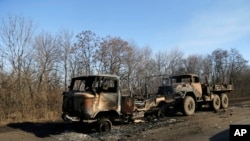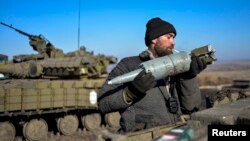The United States says Russia is sending large amounts of military supplies and equipment to pro-Russian fighters in eastern Ukraine, as the deadline for a cease-fire draws near and raging fighting kills at least 26 people.
The fighting in eastern Ukraine on Friday between Ukrainian forces and Russian-backed separatists was especially intense in the strategically important area around Debaltseve.
“We are very concerned about continued fighting along and beyond the line of contact including in heavily populated civilian areas and reports of additional resupplies of tanks and missile systems coming across the border from Russia in the past few day,” said U.S. State Department Spokesperson Jen Psaki during a briefing Friday.
“The Russian military has deployed a large amount of artillery and multiple rocket launcher systems around Debaltseve where it is shelling Ukrainian positions,” said Psaki.
She added that the U.S. had obtained its own information. “We are confident these are Russian military not separatist systems. The Russian military also has air defense systems deployed near Debaltseve. We are also confident these are Russian military not separatist systems.”
The U.S. said it also has evidence that Russian units along the border with Ukraine were preparing a large shipment of supplies meant for pro-Russian forces fighting in eastern Ukraine.
“This is clearly not in the spirit of the week’s agreement,” said Psaki. She called on all sides to show restraint ahead of the cease-fire set to begin at 12.01 a.m. on Sunday.
“Actions, not words, are what will determine whether the agreement will produce what it’s suppose to produce,” she said.
Russia has denied sending troops or weapons across the border to aid in the fighting, which has killed at least 5,400 people and wounded thousands more since separatists launched their uprising 10 months ago.
The cease-fire agreement was reached on Thursday after marathon talks among France, Germany, Ukraine and Russia, Russia-backed separatists in Ukraine and the Organization for Security and Cooperation in Europe [OSCE].
It calls for a cease-fire, the withdrawal of heavy weapons by both sides, for Ukraine to pull back from the current line of contact, for Russian-backed separatists to withdraw to a line agreed upon in a Minsk deal reached in September, and for an exchange of prisoners.
Ukrainian President Petro Poroshenko said Friday that Russia's offensive intensified significantly after the agreement in Minsk.
U.N. Secretary-General Ban Ki-moon praised the efforts of the four leaders to end the pro-Russia uprising in eastern Ukraine, saying he expects the truce deal to be honored by all parties.
French President Francois Hollande said the deal, if honored, amounts to a "comprehensive political solution," while German Chancellor Angela Merkel said it offers "a glimmer of hope." She also said "we have no illusions," and that "much work" remains to establish a lasting peace.
The United States consulted with its allies but did not participate in the Minsk summit. The White House called the deal "a potentially significant step toward a peaceful" end to the conflict.
A White House statement said the "true test" of the accord "will be in its full and unambiguous implementation, including the durable end of hostilities and the restoration of Ukrainian control over its border with Russia."
Ukraine and a host of Western governments accuse Moscow of stoking the rebellion in Ukraine's Russian-speaking east with arms and fighters. Moscow has repeatedly denied providing direct support to rebels, and claims that
G7 reacts to Minsk II
Leaders of the G7 welcomed the February 12 Minsk peace deal as offering “a way forward” to settling the conflict in eastern Ukraine, but expressed concern over “Russian-backed separatist militias … operating beyond the line of contact agreed upon in the Minsk agreements of September 2014.
In a statement issued Friday, the G7 called on all parties to refrain from actions in the coming days that would hinder the start of the cease-fire. It warned violators of the latest Minsk deal about “appropriate measures” and intensified “costs” that could follow. The statement did not specify what these would entail.
The group, joined in the statement by the president of the European Council and the president of the European Commission, also reiterated its condemnation of Russia’s annexation of Ukraine’s Crimea as “illegal” and “in violation of international law.”
Analysts voicing caution about the latest Minsk deal noted that it set no deadline for the withdrawal of Russian forces, weapons and equipment from Ukraine, and did not set a timetable for Ukraine to regain control of its eastern border.
Ukraine's President Petro Poroshenko stressed Thursday that the Ukrainian side did not agree to grant "autonomy" to the rebel-held areas in eastern Ukraine and made no concessions in its opposition to the country's "federalization" — a demand Moscow has repeatedly made.





